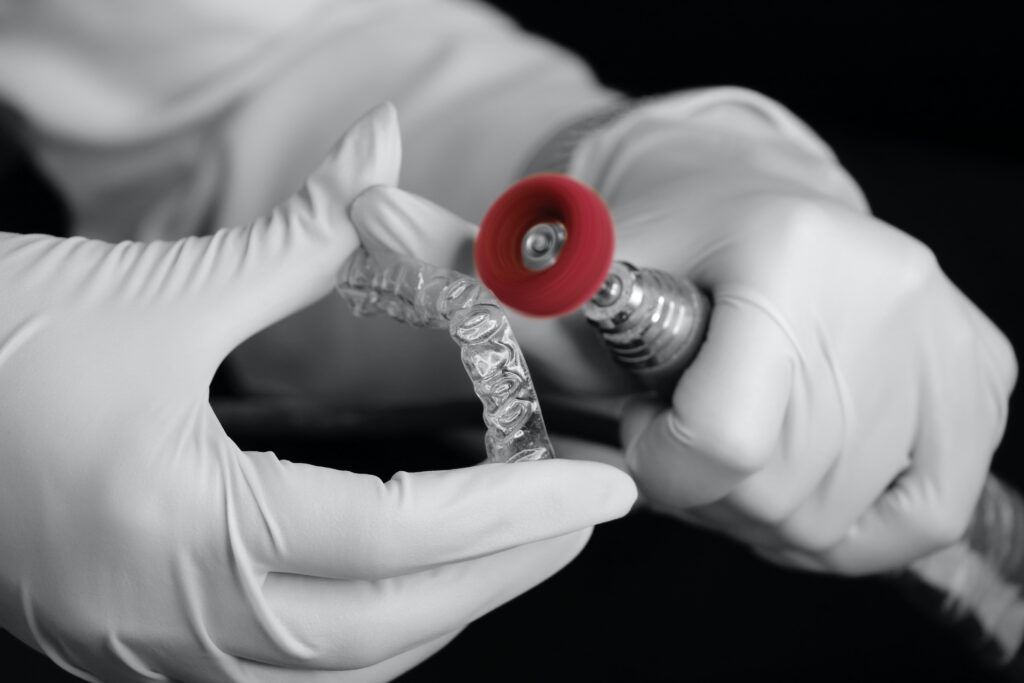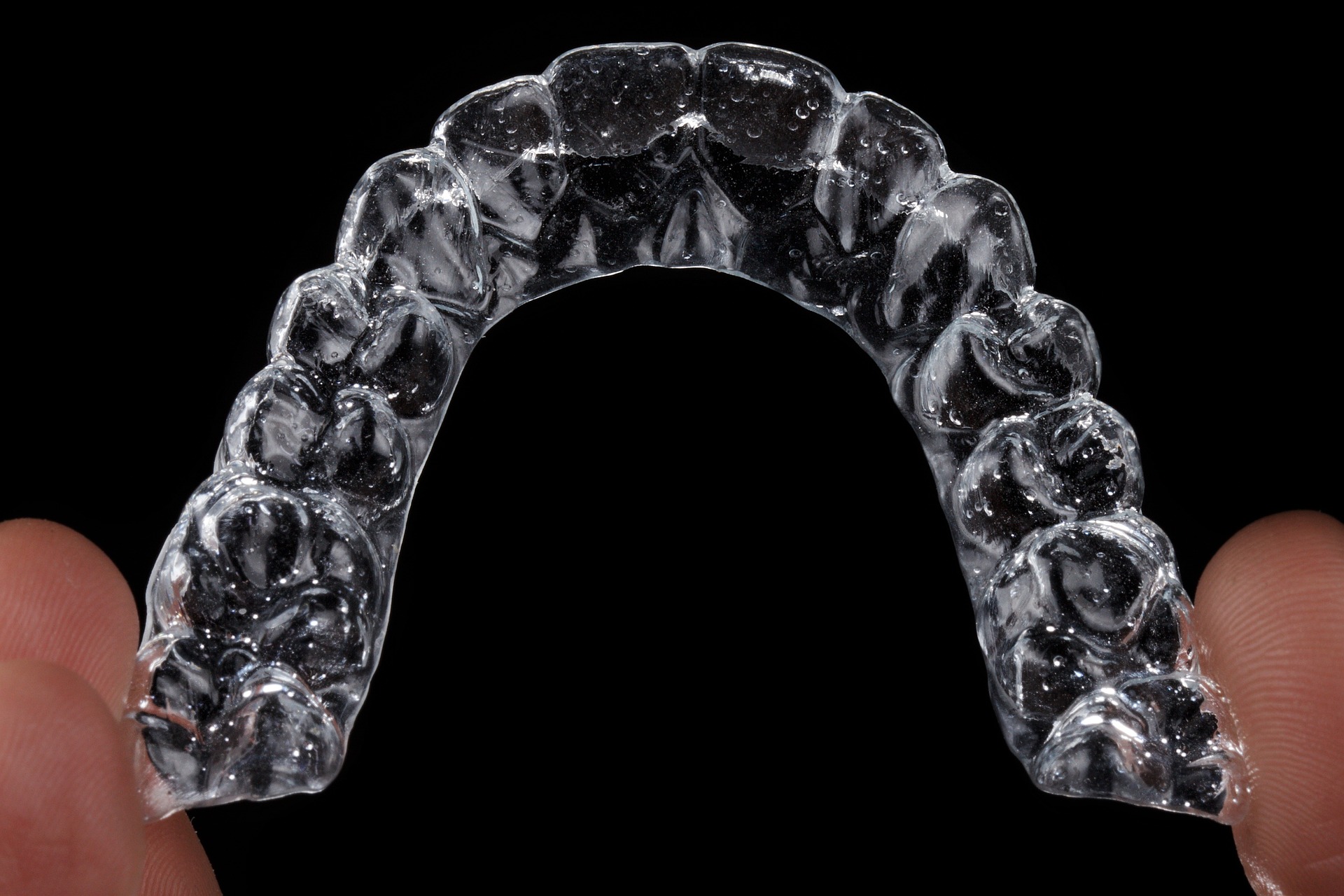If your upper teeth sit inside your lower teeth when you close your mouth, then you’re likely dealing with a crossbite. This misalignment may not seem like a problem now, but it can lead to other issues if left untreated.
Metal braces used to be the only solution for fixing crossbites, but clear aligners like Invisalign are becoming more popular. The question is, can Invisalign fix crossbite, or are the aligners not strong enough?
While they may not be suitable in all cases, the good news is that aligners can fix crossbite for most patients. Here’s how it works.
What is Crossbite?
A crossbite is a misalignment of your teeth. When you bite down, if one or more of your top teeth slide behind the bottom teeth, this is considered a crossbite. It’s not always easy to see because you may only have a few teeth that are in crossbite, and, of course, it’s only noticeable when your mouth is closed.
Over time, these crooked teeth can lead to all sorts of oral health problems. If you’re experiencing frequent toothaches, headaches, or pain while chewing, crossbite may be the culprit.
Types of Crossbite
There are two main types of crossbite that Invisalign can fix. When you visit us at the Dental Health Group, we’ll help you determine which category your crossbite falls into.
Posterior Crossbite
Posterior means further in the back, and these crossbites occur with the back teeth. This misalignment can happen on one or both sides of the dental arches.
Anterior Crossbite
Anterior means closer to the front, and these types of crossbites occur on the front teeth. This misalignment can happen to only one tooth or to multiple teeth — in the case of multiple teeth, it’s sometimes known as an underbite.
What Causes a Crossbite?
In most people, a crossbite is hereditary. Cleft lip or palate, delayed tooth eruption, or abnormal teeth growth are all factors that frequently cause crooked teeth. Some studies have linked crossbite to childhood habits and other factors such as thumb sucking or even heavy breathing through the mouth.
Crossbite is rarely the result of something you consciously did. While you may not know exactly what caused it, you can take action now to fix it with Invisalign.
Can Crossbite Lead to Dental Problems?
Unfortunately, yes — a crossbite is more than just an aesthetic issue. Untreated crossbites can lead to significant oral health problems such as jaw tenderness, tooth pain, restricted airways, receding gums, chipped teeth, and even speech impediments or difficulty chewing. The misalignment will make plaque buildup more likely, and down-the-road consequences can include painful gum diseases and bone loss.
It’s crucial to address a crossbite as soon as you can. Waiting will only make the treatment more difficult as you get older.
How to Fix Crossbite With Invisalign
Orthodontics can help you with your crossbite. Invisalign clear aligners can treat most types of crossbite and are especially effective in milder cases — another reason not to let the problem get worse. For more severe cases of crossbite, traditional metal braces are typically the more effective option.
Fixing Posterior Crossbites With Invisalign
Correcting posterior crossbites with only Invisalign can be challenging. That is why it’s better to use a combination of Invisalign aligners and other types of expanders.
For instance, orthodontists can fix mild crossbites with Invisalign and elastics. The elastics will function like clear aligners and gradually align the teeth. For moderate cases of posterior crossbite, dentists may use Invisalign with a quad helix expander. This orthodontic device has four active springs and helps Invisalign create proper alignment and bite.
More severe cases of posterior crossbite can benefit from a combination of Invisalign and a rapid palatal expander. This expander is more suitable for younger patients as it expands the palatal bones to create alignment.
Fixing Anterior Crossbites With Invisalign
Fixing anterior crossbites with clear aligners alone is more feasible. Dentists can fix mild and moderate anterior crossbites with only Invisalign; they may not need other orthodontic appliances.
This process is straightforward for single-tooth anterior crossbites. However, correcting an anterior crossbite with multiple teeth is more challenging. This condition, also called an underbite, can benefit more from a combination of Invisalign aligners, elastics, and, in rarer cases, sometimes even tooth extractions.
How the Process Works

Now that you know how to fix crossbites with Invisalign, you can find a good dentist and start the procedure. Here are the steps involved.
- First, you have to visit a dentist for a consultation. The dentist will thoroughly examine your teeth using digital scans and make a treatment plan.
- Next, the dentist will make you a series of Invisalign aligners that can fix your crossbite. Your customized aligners should fit seamlessly inside your mouth.
- You must wear your aligners for 22+ hours daily, only removing them when you want to eat, brush, and floss. Every two weeks, Invisalign will painlessly shift your teeth and jaw into the correct position by 0.25 – 0.3 millimeters until they reach the desired alignment.
- You will visit the dentist two weeks after starting treatment for a follow-up appointment. They will check your progress and give you the remaining sets of aligners.
- You will see the dentist every six weeks and switch your aligners regularly so Invisalign can successfully fix your crossbite.
How Long Does it Take to Fix a Crossbite With Invisalign?
Treatment time varies based on the severity of your crossbite, how often you wear your aligners, and other dental issues. For instance, having crowded teeth with your crossbite can extend the treatment period.
It can take Invisalign as few as three months to fix mild crossbites. The treatment can take up to 18 months or more for those with more severe crossbites.
Pros and Cons of Invisalign for Crossbites
Invisalign is one of the most popular dental services for fixing crossbites. However, it’s not the only option. You can also get metal braces or undergo surgery. However, Invisalign can fix crossbites with the following pros:
- Removable and easier to clean
- More comfortable and discrete
- Covering the entire biting surface
- No metal wires to cut your mouth
That said, the aligners can be expensive and are often not covered by insurance plans. The treatment may not be effective for severe cases of crossbite, and the patient must be actively involved. Failing to wear the aligners regularly will negate the treatment.
Fix Your Crossbite with the Dental Health Group
Dr. Erwin Abad can fix your crossbite with Invisalign and give you the dental care you deserve. We see patients from all over Los Angeles. We know that restorative dentistry is an art as well as a science, and we work with you to craft a beautiful smile through tailored solutions. Your care is our passion. Schedule your appointment today for your first consultation.


